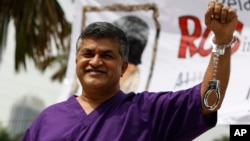The January massacre at the French satirical magazine Charlie Hebdo focused world attention on the sometimes deadly threats political cartoonists face.
But it’s far from an isolated incident, according to a new report from the Committee to Protect Journalists which calls the threat a “global phenomenon.”
The release of the report “Drawing the Line: Cartoonists Under Threat” documents cases from Malaysia, India, South Africa, Bangladesh, Venezuela, the United States, Ecuador, Sri Lanka, Syria and Iran.
The CPJ findings show that “cartoonists have been targeted with censorship, punitive lawsuits, physical assault, imprisonment, disappearance, and murder for their art-form journalism.”
“There is almost a formula that we can recognize well in advance that tells us when things are getting risky for cartoonists,” said Robert Russell, executive director of Cartoonists Rights Network International, an advocacy and monitoring group based in the U.S., in a statement.
“Any failed state or ceramic leader headed toward either an election or some kind of political transition will always crack down on cartoonists during times of insecurity and strife,” he said.
According to the CPJ, social media has played a role in the growing risk cartoonists face.
“In many quarters, cartoons are reaching people now more than ever with the advent of social media,” said Aseem Trivedi, an Indian cartoonist, in a statement. Trivedi added that “if there’s a message that speaks to something greater, its chances of going viral and spreading to the masses are high.”
Increased visibility has also given fodder for enemies of free speech, Russell said.
“Both governments and the intolerant monitor social networks very closely, hunting for any sign of adverse commentary,” Russell said. “The world is unfortunately waking up to the power and influence of cartoonists, [responding] through the exercise of violence and murder.”
While there were many public displays of support for Charlie Hebdo, the CPJ said the event caused “the spread of measures against ‘offensive’ speech and greater surveillance of media in the name of combating terrorism.”
In many of the countries studied by the CPJ, cartoonists faced threats of arrest, were forced into exile or worse.
Malaysian cartoonist Zulkiflee Anwar Ulhaque, known as Zunar could be jailed for up to 43 years for cartooning, according to the CPJ. His trial begins later this month.
“In a corrupt regime, the truth is seditious,” said Zunar, who has had five books banned since 2010. “I will keep drawing until the last drop of my ink.”




